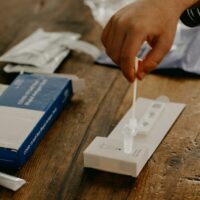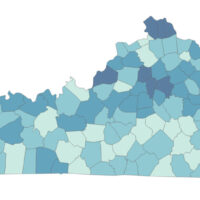UPDATE (11/4/2021): During his media briefing on Thursday, Nov. 4, Gov. Andy Beshear said children ages 5 to 11 should be able to get vaccinated in Kentucky as early as next week. Previously, it was believed vaccinations within the age group would begin sooner.
The Centers for Disease Control and Prevention has formally recommended the Pfizer-BioNTech coronavirus vaccine for 5- to 11-year-olds.
After the agency’s immunization advisory committee — an independent group of experts — voted 14-0 to approve it, CDC Director Rochelle Walensky endorsed the recommendation.
“We know millions of parents are eager to get their children vaccinated and, with this decision, we now have recommended that about 28 million children receive a COVID-19 vaccine,” Walensky said. “As a mom, I encourage parents with questions to talk to their pediatrician, school nurse, or local pharmacist to learn more about the vaccine and the importance of getting their children vaccinated.”
The vaccine will be available to Kentucky children on Wednesday.
Gov. Andy Beshear said Monday that the state will be ready to provide vaccinations to one-third of 5- to 11-year-olds on Wednesday, and half of them within the first week of availability. He said the vaccine will largely be available in the same places that the adult vaccine is available.
“We are ready as soon as any set of parents are ready,” he said. But it’s uncertain just how many parents will be.
A Kaiser Family Foundation poll taken Oct. 21 found that about three in 10 parents of 5-to-11-year-olds (27%) said they will get their child vaccinated “right away” while one-third (33%) said they will “wait and see” how the vaccine is working. Three in 10 parents said they would “definitely not” get their children the shot, and 5% said they would “only if required.”
An unscientific Lexington Herald-Leader poll that included 1,824 participants as of Nov. 2 found that 77% of the respondents said they would not get the vaccine for their 5-to-11-year-olds; 21% said they would; and 2 % were undecided. While such polls are self-selected, depending on the motivation to participate, this one may confirm a reluctance in Kentucky like that in the rest of the nation.
Beshear said last week that “Vaccine effectiveness for kids hasn’t been fully communicated to parents yet.” The U.S. Food and Drug Administration issued an emergency use authorization for the Pfizer vaccine for 5-to-11-year-olds last week, saying the benefits of the vaccine outweigh the risk to children.
Pfizer says its clinical trials in children 5 to 11 found the vaccine to be 90.7% effective in preventing symptomatic disease, using a dose that is one-third of the adolescent and adult dose.
Safety data from the trials, which included more than 3,000 children, found the most common reactions were pain at the injection site, fatigue and headache. Reactions were mostly mild or moderate. There were no serious adverse events related to the vaccine.
The study was not large enough to detect a condition called myocarditis, which has mostly been found in young men and teen boys. And one of the CDC advisors told the panel that the danger to the heart is greater if the child gets the disease, reports The Associated Press.“The risk of some sort of bad heart involvement is much higher if you get COVID than if you get this vaccine,” Dr. Matthew Oster, a pediatric cardiologist at Emory University, told the panel. “COVID is much riskier to the heart.”
The Pfizer vaccine will be administered in two doses, three weeks apart, using a smaller needle. Roughly 28 million children will be eligible for it.
Health-care providers must use doses that are specifically created for children under 12, which come in a vial with an orange cap. The adult and adolescent vaccine comes in a purple-topped vial. They are not interchangeable.
The Kaiser foundation’s news release said parents’ main concerns when it comes to vaccinating their younger children have to do with potential unknown long-term effects and serious side effects of the vaccines, including two-thirds who are concerned the vaccine may affect their child’s future fertility, despite the CDC stating there is no evidence that the COVID-19 vaccines cause fertility problems.
“Unfounded claims linking COVID-19 vaccines to infertility have been scientifically disproven,” the American Academy of Pediatrics says in a statement on its website.”There is no evidence that the vaccine can lead to loss of fertility. While fertility was not specifically studied in the clinical trials of the vaccine, no loss of fertility has been reported among trial participants or among the millions who have received the vaccines since their authorization, and no signs of infertility appeared in animal studies,” it adds. “Similarly, there is no evidence that the COVID-19 vaccine affects puberty.”
Other concerns involved a need for more information, concerns about missing work to deal with children’s vaccinations, cost, not being able to get the vaccine from a trusted place, and issues around transportation to get the vaccine for their child.
Children who are unvaccinated should continue to wear a mask in public spaces and around people they do not live with, says the CDC.
As of Oct. 28, 6.4 million children under the age of 18 had been diagnosed with COVID-19, representing 16.6% of all cases; between Oct. 21 and Oct. 28, 24.2% of all cases were in this group, according to the American Academy of Pediatrics and the Children’s Hospital Association weekly report. In Kentucky, 20.9% of cases have been in people under the age of 20.
The AP reports, “In the U.S., there have been more than 8,300 hospitalizations of kids ages 5 to 11, about a third requiring intensive care, according to government data. The CDC has recorded at least 94 deaths in that age group, with additional reports under investigation.”






